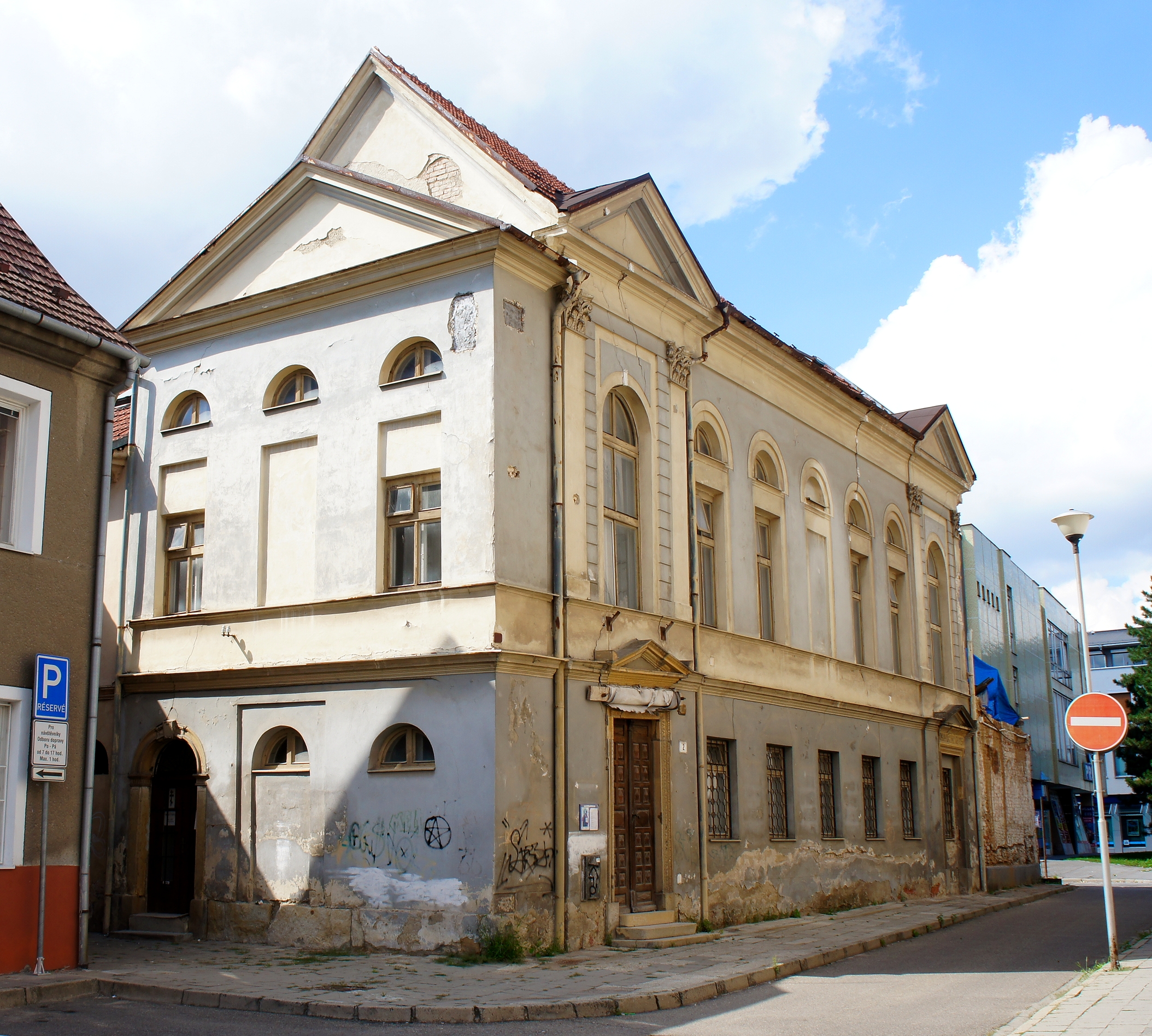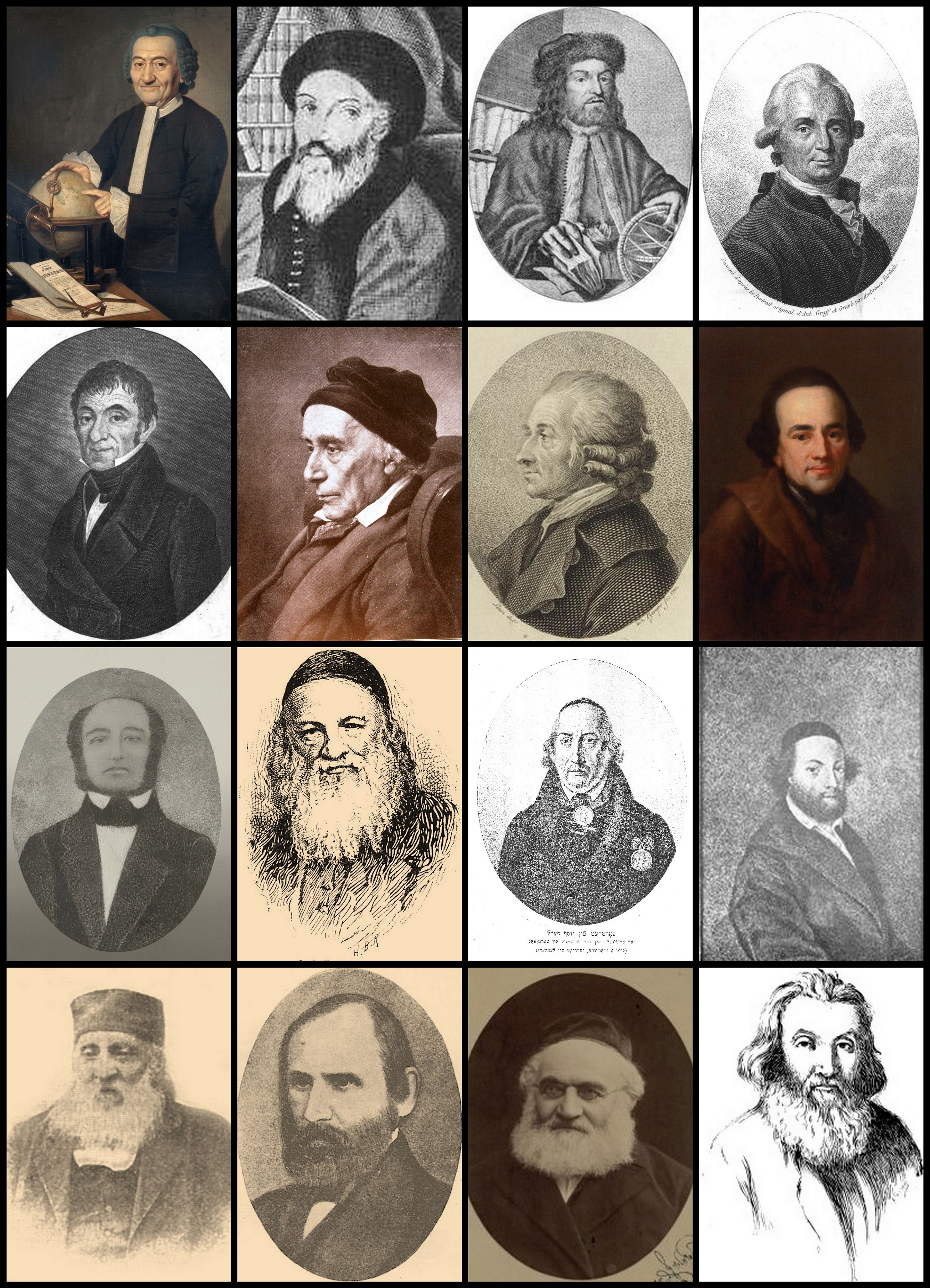|
Jews In Prostějov
The Jewish community in Prostějov was one of the biggest Jewish communities in the Moravian region called the "''Jerusalem of Hana''".The Jewish quarter remained until 1990 when they demolished the buildings. There are two former synagogues: New Synagogue (now Hus Congregational House) and Synagogue Beit Ha-Midrash (owned by Orthodox Church). Rabbi Meir Eisenstadt, Judah Leib Prossnitz, Rabbi Jonathan Eybeschutz, Rabbi Nathan Porges, Rabbi Moses Sofer, orientalist Moritz Steinschneider and famous philosopher Edmund Husserl lived here.''Content in this edit is translated from the existing Czech Wikipedia article at cz:Židé v Prostějově; see its history for attribution.'' Starting in the Middle Ages, Prostějov had important textile and ready-made clothing industries, in which Jews had a central role, although they sometimes clashed with Christian guilds. The first documents that mention Jews in the city date back to 1445. The Jewish community in the city was largely founded b ... [...More Info...] [...Related Items...] OR: [Wikipedia] [Google] [Baidu] |
History Of The Jews In Vienna
The history of the Jews in Vienna, Austria, goes back over eight hundred years. There is evidence of a Jewish presence in Vienna from the 12th century onwards. At the end of the 19th century and the start of the 20th century, Vienna was one of the most prominent centres of Jewish culture in Europe, but during the period of National-Socialist rule in Austria, Vienna's Jewish population was almost entirely deported and murdered in the Holocaust. Since 1945, Jewish culture and society have gradually been recovering in the city. History Middle Ages Proof exists of a Jewish presence in Vienna since 1194. The first named individual was ''Schlom'', Duke Frederick I’s Münzmeister (master of the mint). In 1238, emperor Frederick II granted the Jews a privilege, and the existence of community institutions such as a synagogue, hospital and slaughterhouse can be proven from the 14th century onwards. Vienna’s city law empowered a special ''Judenrichter'' (''Judge of the Jews ... [...More Info...] [...Related Items...] OR: [Wikipedia] [Google] [Baidu] |
History Of Moravia
The history of Moravia, one of the Czech lands, is diverse and characterized by many periods of foreign governance. Pre-history Early modern humans had settled in the region by the Paleolithic. The Předmostí archaeological site in Moravia is dated to between 24,000 and 27,000 years old. Ancient Moravia Around 60 BC the Celtic Volcae people withdrew from the region and were succeeded in turn by the Germanic Quadi. Several hundred years later, in the 6th century AD the Slavic tribes arrived in this territory often crossed during the Migration Period by successive Germanic and major Slavic tribes. At the end of the 8th century the Moravian Principality came into being in present-day south-eastern Moravia, Záhorie in south-western Slovakia and parts of Lower Austria. In 833 AD, this became the state of Great Moravia with the conquest of the Principality of Nitra (present-day Slovakia). Their first king was Mojmír I (ruled 830–846). Louis the German invaded Moravia and rep ... [...More Info...] [...Related Items...] OR: [Wikipedia] [Google] [Baidu] |
Holocaust
The Holocaust, also known as the Shoah, was the genocide of European Jews during World War II. Between 1941 and 1945, Nazi Germany and its collaborators systematically murdered some six million Jews across German-occupied Europe; around two-thirds of Europe's Jewish population. The murders were carried out in pogroms and mass shootings; by a policy of extermination through labor in concentration camps; and in gas chambers and gas vans in German extermination camps, chiefly Auschwitz-Birkenau, Bełżec, Chełmno, Majdanek, Sobibór, and Treblinka in occupied Poland. Germany implemented the persecution in stages. Following Adolf Hitler's appointment as chancellor on 30 January 1933, the regime built a network of concentration camps in Germany for political opponents and those deemed "undesirable", starting with Dachau on 22 March 1933. After the passing of the Enabling Act on 24 March, which gave Hitler dictatorial plenary powers, the government began isolating Je ... [...More Info...] [...Related Items...] OR: [Wikipedia] [Google] [Baidu] |
Extermination Camps
Nazi Germany used six extermination camps (german: Vernichtungslager), also called death camps (), or killing centers (), in Central Europe during World War II to systematically murder over 2.7 million peoplemostly Jewsin the Holocaust. The victims of death camps were primarily murdered by gassing, either in permanent installations constructed for this specific purpose, or by means of gas vans. The six extermination camps were Chełmno, Belzec, Sobibor, Treblinka, Majdanek and Auschwitz-Birkenau. Auschwitz and Majdanek death camps also used extermination through labour in order to kill their prisoners. The idea of mass extermination with the use of stationary facilities, to which the victims were taken by train, was the result of earlier Nazi experimentation with chemically manufactured poison gas during the secretive Aktion T4 euthanasia programme against hospital patients with mental and physical disabilities. The technology was adapted, expanded, and applied in wartime ... [...More Info...] [...Related Items...] OR: [Wikipedia] [Google] [Baidu] |
Nazis
Nazism ( ; german: Nazismus), the common name in English for National Socialism (german: Nationalsozialismus, ), is the far-right totalitarian political ideology and practices associated with Adolf Hitler and the Nazi Party (NSDAP) in Nazi Germany. During Hitler's rise to power in 1930s Europe, it was frequently referred to as Hitlerism (german: Hitlerfaschismus). The later related term "neo-Nazism" is applied to other far-right groups with similar ideas which formed after the Second World War. Nazism is a form of fascism, with disdain for liberal democracy and the parliamentary system. It incorporates a dictatorship, fervent antisemitism, anti-communism, scientific racism, and the use of eugenics into its creed. Its extreme nationalism originated in pan-Germanism and the ethno-nationalist '' Völkisch'' movement which had been a prominent aspect of German nationalism since the late 19th century, and it was strongly influenced by the paramilitary groups that emerged af ... [...More Info...] [...Related Items...] OR: [Wikipedia] [Google] [Baidu] |
Gestapo
The (), abbreviated Gestapo (; ), was the official secret police of Nazi Germany and in German-occupied Europe. The force was created by Hermann Göring in 1933 by combining the various political police agencies of Prussia into one organisation. On 20 April 1934, oversight of the Gestapo passed to the head of the ''Schutzstaffel'' (SS), Heinrich Himmler, who was also appointed Chief of German Police by Hitler in 1936. Instead of being exclusively a Prussian state agency, the Gestapo became a national one as a sub-office of the (SiPo; Security Police). From 27 September 1939, it was administered by the Reich Security Main Office (RSHA). It became known as (Dept) 4 of the RSHA and was considered a sister organisation to the (SD; Security Service). During World War II, the Gestapo played a key role in the Holocaust. After the war ended, the Gestapo was declared a criminal organisation by the International Military Tribunal (IMT) at the Nuremberg trials. History After Adol ... [...More Info...] [...Related Items...] OR: [Wikipedia] [Google] [Baidu] |
German Occupation Of Czechoslovakia
German(s) may refer to: * Germany (of or related to) ** Germania (historical use) * Germans, citizens of Germany, people of German ancestry, or native speakers of the German language ** For citizens of Germany, see also German nationality law **Germanic peoples (Roman times) * German language **any of the Germanic languages * German cuisine, traditional foods of Germany People * German (given name) * German (surname) * Germán, a Spanish name Places * German (parish), Isle of Man * German, Albania, or Gërmej * German, Bulgaria * German, Iran * German, North Macedonia * German, New York, U.S. * Agios Germanos, Greece Other uses * German (mythology), a South Slavic mythological being * Germans (band), a Canadian rock band * "German" (song), a 2019 song by No Money Enterprise * ''The German'', a 2008 short film * "The Germans", an episode of ''Fawlty Towers'' * ''The German'', a nickname for Congolese rebel André Kisase Ngandu See also * Germanic (other) * Ger ... [...More Info...] [...Related Items...] OR: [Wikipedia] [Google] [Baidu] |
World War I
World War I (28 July 1914 11 November 1918), often abbreviated as WWI, was one of the deadliest global conflicts in history. Belligerents included much of Europe, the Russian Empire, the United States, and the Ottoman Empire, with fighting occurring throughout Europe, the Middle East, Africa, the Pacific, and parts of Asia. An estimated 9 million soldiers were killed in combat, plus another 23 million wounded, while 5 million civilians died as a result of military action, hunger, and disease. Millions more died in genocides within the Ottoman Empire and in the 1918 influenza pandemic, which was exacerbated by the movement of combatants during the war. Prior to 1914, the European great powers were divided between the Triple Entente (comprising France, Russia, and Britain) and the Triple Alliance (containing Germany, Austria-Hungary, and Italy). Tensions in the Balkans came to a head on 28 June 1914, following the assassination of Archduke Franz Ferdin ... [...More Info...] [...Related Items...] OR: [Wikipedia] [Google] [Baidu] |
Haskalah
The ''Haskalah'', often termed Jewish Enlightenment ( he, השכלה; literally, "wisdom", "erudition" or "education"), was an intellectual movement among the Jews of Central and Eastern Europe, with a certain influence on those in Western Europe and the Muslim world. It arose as a defined ideological worldview during the 1770s, and its last stage ended around 1881, with the rise of Jewish nationalism. The ''Haskalah'' pursued two complementary aims. It sought to preserve the Jews as a separate, unique collective, and it pursued a set of projects of cultural and moral renewal, including a revival of Hebrew for use in secular life, which resulted in an increase in Hebrew found in print. Concurrently, it strove for an optimal integration in surrounding societies. Practitioners promoted the study of exogenous culture, style, and vernacular, and the adoption of modern values. At the same time, economic production, and the taking up of new occupations was pursued. The ''Haskalah'' pr ... [...More Info...] [...Related Items...] OR: [Wikipedia] [Google] [Baidu] |
Frankism
Frankism was a heretical Sabbatean Jewish religious movement of the 18th and 19th centuries, centered on the leadership of the Jewish Messiah claimant Jacob Frank, who lived from 1726 to 1791. Frank rejected religious norms and said that his followers were obligated to transgress as many moral boundaries as possible. At its height it claimed perhaps 50,000 followers, primarily Jews living in Poland, as well as in Central and Eastern Europe. Description Unlike traditional Judaism, which provides a set of detailed social, cultural, and religious norms and laws (''halakha'') that regulate many aspects of life of observant Jews, Frank claimed that "all laws and teachings will fall""The Collection of the Words of the Lord" by Jacob Frank, translated by Harris Lenowitz. Saying 103. and, following antinomianism, asserted that the most important obligation of every person was the transgression of every boundary. Frankism is associated with the Sabbateans of Turkey, a religious moveme ... [...More Info...] [...Related Items...] OR: [Wikipedia] [Google] [Baidu] |
Shabbatean
The Sabbateans (or Sabbatians) were a variety of Jewish followers, disciples, and believers in Sabbatai Zevi (1626–1676), a Sephardic Jewish rabbi and Kabbalist who was proclaimed to be the Jewish Messiah in 1666 by Nathan of Gaza. Vast numbers of Jews in the Jewish diaspora accepted his claims, even after he outwardly became an apostate due to his forced conversion to Islam in the same year. Sabbatai Zevi's followers, both during his proclaimed messiahship and after his forced conversion to Islam, are known as Sabbateans. Part of the Sabbateans lived on until well into 21st-century Turkey as descendants of the Dönmeh. Sabbatai Zevi Sabbatai Zevi was a Sephardic ordained rabbi from Smyrna (now İzmir, Turkey). A kabbalist of Romaniote origin, Zevi, who was active throughout the Ottoman Empire, claimed to be the long-awaited Jewish Messiah. He was the founder of the Sabbatean movement, whose followers subsequently were to be known as Dönmeh "converts" or crypto-Jew ... [...More Info...] [...Related Items...] OR: [Wikipedia] [Google] [Baidu] |





_1894_A._Kraushar%2C_Frank_i_frankiści_polscy%2C_Vol._2.jpg)